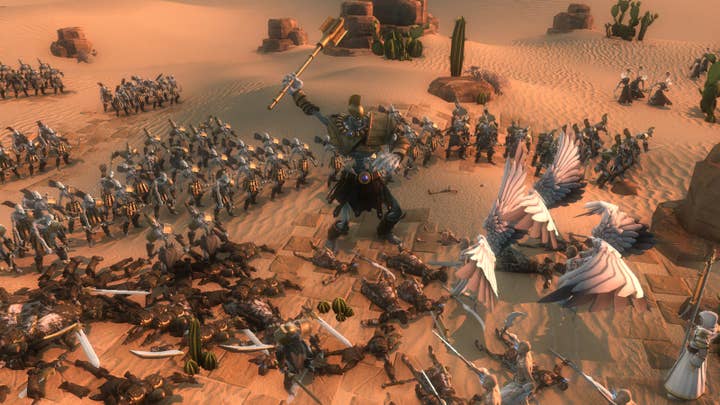Paradox: Pricing is difficult "when the world is constantly changing"
CPO Johan Sjöberg reflects on this summer's price hike controversy, and looks toward a future on console and mobile
Back in June, Paradox Interactive found itself set upon by frustrated consumers after eagle-eyed fans realised the publisher had raised its prices in certain regions around the world.
The cost for select games rose by as much as 40%, with the firm later explaining that adjustments had been made to "create a more equal price point" given the ongoing shifts between the world's biggest currencies. Prior to the tweaks, games had become cheaper in some territories than others and Paradox was keen to strike a balance.
This was not well received. Eventually the CEO, Fredrik Wester, promised to refund anyone who had purchased the games at a higher price, later offering free DLC when it was established refunds weren't "practically possible."
Two months on and chief product officer Johan Sjöberg tells us it's still a constant topic of discussion behind the scenes. "It's extremely difficult," he tells GamesIndustry.biz. "The one thing we've learned from this experience is that we obviously made a mistake and we're sorry for that.
"We've had a lot of ongoing discussions internally addressing, among other things, how we can make sure we're charging the right price for the right product in the right territory when the world is constantly changing. Nothing is an exact science. We'll see where we end up. We're trying to find a way forward that won't leave us in this particular situation again."
"We'll see where we end up. We're trying to find a way forward that won't leave us in this particular situation again"
While communication could certainly have been handled better, there seems to be nothing unreasonable behind Paradox's decision to increase prices. Companies like Riot Games and even Apple were compelled to adjust their pricing after Brexit sent shockwaves through the financial community. As much as publishers like Paradox like to service their players' wants and desires, they still need to pay the bills.
"If you look at it from our perspective, we want as large an audience as possible to be able to enjoy our games," says Sjöberg. "But we also need to balance that because we're a business, and we need to make money in order to stay in business."
The widely publicised backlash and reversal of Paradox's price adjustment will also have repurcussions should the publisher deem it necessary to do so again. Sjöberg acknowledges that should another increase be required, "people will be watching more closely."
"We just need to factor that into account when we make any future adjustments," he continues. "But we'll see. It's pure speculation whether adjustments will even be needed or not. We just need to make sure we're very clear in our communication about everything we do."
He's reluctant to give any advice on how other publishers should handle regional price adjustments, but stresses something that rings true for so many difficult situations in this industry.
"Make sure you listen to your players and communicate with your community," he says. "It's as simple as that."

It's a shame the price hike was greeted with such negativity, because Paradox has been enjoying a highly promising year. The publisher has opened a new mobile studio in Sweden, acquired Age of Wonders developer Triumph Studios, and made a major hire in Civilization V designer Jon Shafer.
The company has also enjoyed ongoing success with its publishing deal for the console version of Cities: Skylines, with Obsidian's Pillars of Eternity and Haemimont collaboration Surviving Mars still to come. In fact, console is playing an increasingly significant role in the Paradox portfolio.
"When it comes to console, we're trying increasingly to find concepts that fit cross-platform and that work on multiple platforms, that are adaptable to the type of user input you have on the console platforms," says Sjöberg. "With the combined market size of PlayStation and Xbox, there's a large addressable audience out there for the right type of product. We're putting significant effort into finding games that straddle the PC and console platforms and do that well."
"We're putting significant effort into finding games that straddle the PC and console platforms and do that well"
The publisher's current slate of console releases are also focused on PS4 and Xbox One, but has Paradox given any thought about the Nintendo Switch? No doubt there are plenty of consumers who would enjoy a deep strategy experience during a lengthy flight or train journey.
"We're not the fastest movers," Sjöberg admits. "I think it's fantastic that Nintendo has seen such great success with the Switch. However, Paradox has made a great business out of sometimes sticking to our guns while other people go elsewhere.
"When everyone moved to consoles in the mid-2000s, we stuck to PC and that worked out fine for us. We like to see markets as somewhat more proven before we decide to make a move, and it's hard at the moment to judge whether Switch will be a great place for third parties. There a few things I've really enjoyed playing on Switch, so we'll see."
But there's still a major portable shift in the works at the publisher. Late last year, the firm hired former King Malmö general manager Kim Nordstrom, who is working with the new Paradox studio in that city to bring some of its most popular IP to smart devices. We spoke to Nordstrom earlier this year about how he is tackling this challenge.

However, while other publishers have shifted their efforts almost entirely to mobile, Sjöberg assures that plans for smartphones will be "no distraction from our focus on PC". He acknowledges that mobile is a "slightly different beast" and Paradox is being cautious about how it approaches this highly competitive market.
"Anybody that moves into mobile as a platform for the first time opens up a massive potential audience for themselves," Sjöberg says. "The thing we've said about our move into mobile is that we still want to focus on the core values that we believe are valid to our players, the ones we've had with us since the early days of PC.
"Mobile obviously has a magnificent growth potential... However, we need to make sure we do it right and in a fashion that feels like Paradox"
"We're still going to focus on deep and complex products that you play for hundreds of hours. However, we'll adapt the way that you consume that experience to what's suitable for the platform.
"It opens up the potential to reach a whole new audience, but perhaps not everybody that plays on mobile will necessarily will want to engage with the type of experiences we'll bring. It's going to be very, very exciting to see once we get our first real experiments into the market."
Historically a PC-based, strategy-focused developer and publisher, Paradox's ventures into new genres and platforms shows a company that is carefully evolving - but Sjöberg says this is in keeping with the firm's journey so far.
"We focus on very specific types of games," he says. "We started out as a developer of strategy games, metamorphed into a publisher of strategy games and then we've expanded that to include management games and RPGs as well. It's obvious when you look at those three genres that there's ample opportunity for us to grow within each one, just on the platform on which we're now primarily active.
"Mobile obviously has a magnificent growth potential as anyone who reads market data knows. However, we need to make sure we do it right and in a fashion that feels like Paradox.
"That's our primary way of expanding. We're doing things very differently with mobile, we're doing things on more platforms, and we're continuing to grow in the segments where we're active."
Johan Sjöberg is a member of the advisory board for Devcom, the new developers conference that debuts in Cologne later this month. The event runs from August 20th to 24th.
GamesIndustry.biz is an official media partner for Devcom. The organisers are paying for our travel and accommodation.
